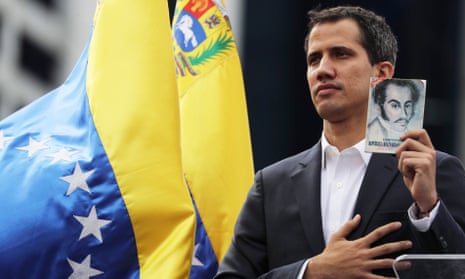When Juan Guaidó, the newly minted Venezuelan opposition leader took the oath and declared himself the country’s interim president, he did so holding an incongruous copy of the country’s constitution. It was emblazoned with the mustachioed face of Simón Bolívar, the Venezuelan military leader who liberated the Andes from the Spanish empire in the early 19th century.
Bolívar is a national hero in Venezuela and, with monuments dedicated to him at home and in many cities across the north of South America, it’s little surprise that politicians have long sought to use his legacy to rally supporters. Nicolás Maduro and his late predecessor, Hugo Chávez, co-opted the image, framing their socialist project as a continuation of Bolívar’s freedom-fighting tenacity.
When Chávez was elected in 1999, he changed the official name of the country to the Bolivarian Republic of Venezuela, and in 2012 commissioned a £90m mausoleum to house the liberator’s exhumed remains.
Maduro, who succeeded Chávez after his death from cancer in 2013, kept up the trope. In one of his more fanatical moments in late 2017, Maduro claimed that Bolívar’s spirit had become incarnated in the Venezuelan people.
Despite the revolutionary’s appropriation by the chavistas (followers of Chávez), Bolívar’s legacy remains intact. After all, his image had once been tied to the Venezeulan nationalist military dictatorship of Marcos Pérez Jiménez which ended in 1958.
Guaidó’s decision to use a copy of the constitution with Bolívar face – rather than Venezuela’s stately shield and crest – indicates that the marriage of the liberator’s legacy and turbulent politics will continue.
